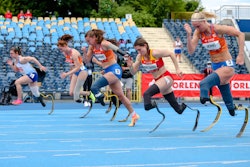Patricia
Doty is far from the traditional college student. At 55, when most her age are
discussing retirement plans, she still has dreams, and one of them she recently
accomplished when she graduated with a master’s degree in vocational
rehabilitation from Winston-Salem State University, in North Carolina.
Doty was one of 297 non-traditional students
who graduated this past spring from the historically Black university, along
with 284 “traditional” students.
Growing up with a learning disability that Doty
said “back in those days they didn’t have a name for,” she never thought
this day would come so soon, but through perseverance and
determination she made it happened.
When Doty graduated from high school, in Vermont, she could barely read or
write. Because there weren’t any diagnostics tests available, Doty said as
a teen her disability was mistaken for laziness. She was put in “special”
typing and English classes for “slow students,” and was often isolated and
humiliated in front of her peers because of her slow leaning pace.
”A lot of people thought I was just lazy and did
not want to out forth this effort, and my mother thought I could do it, all I
had to do was put my head into it, and help [overcome] my fear.”
The fear Doty mentions is that of reading and
writing and at times it seemed that she would carry it on for life. After high school Doty found an alternative
for the basic skills she lacked, working “hands on” with a career in
cosmetology. Though she was doing well in the field, her fear of reading and
writing took a toll and she never took the state board exams to become
certified.
Then she tried college by attending Johnson State
College, in Vermont, to improve her writing and reading but dropped out to
get married.
It was then that an old college friend offered her
a position in a resident group home facility, an introduced to the field and career
that would change her life forever; vocational rehabilitation services.
Doty said she enjoyed the new job and that the idea
of helping people who needed help motivated her to go back to school.
At 35, she was diagnosed with a learning disability. Using
the diagnosis, Doty learned to adapt using remedial training tools. The
programs she used include a typing class, tapes to record business conferences
and software such as Dragon Dictates; that she could speak into and it
would automatically type what she wanted to say.
She then returned
to Johnson State. Though she struggled, she was
able, at age 44, to earn a Bachelor of Science in sociology and anthropology
with help from professors and tutors.
Upon moving to North Carolina, Doty’s 17 years
experience in vocational rehabilitation helped her secure a position as a
coordinator of a school-to-work transition program, in which she helps guide
high school students with disabilities transition from the classroom into the
work place.
However, because “the state will soon require
rehabilitation counselors to have master’s degrees” Doty had to go back to
college and so she enrolled at WSSU with support from her job.
Dr. Cynthia Brown, chair of Human Performance and Sports
Science, the department which housed the vocational rehabilitation masters
program at WSSU, was a witness of Doty’s struggle to success.
Brown said though the university provided accommodations
for students with disabilities, Doty, who graduated with a 3.7 GPA, went above
and beyond to find other ways to get assistance and succeeded. Some of the
efforts include hiring an editor for her papers, and beginning her assignments
and projects far ahead of their due date.
“[Doty’s] planning was one of the important things that
helped her finish and with such a high GPA,” said Brown. “Patricia was aware of
her disability and knew how to compensate her weak areas…and knew what it took
to be successful.”
Now that she’s earned her master’s degree, Doty is amazed
by her own accomplishment.
“I remember when I was told that I made all the
requirements to graduate,” said Doty. “I called my husband and I was just
crying, like somebody opened the dam. I told myself I can’t believe I did it. I
actually did it.”
This second time in college, Doty said was her
“last journey” in finding who she was, and was able to do it only because of
the support she received from her husband and son. While she was enrolled in
school her husband and her sons took on all of the tasks at home and she was
able to devote her time to work and her classes.
Doty advices adults in similar situations as her to “take
it one step at a time,” and to believe in themselves. “I figured I would get
here and I did.”
However, the biggest accomplishment Doty said
she has made is one that comes with time and not a degree — facing her
fears.
”I am not fearful anymore. If don’t know
something I will ask [openly].”
– Margaret Kamara
There are currently 0 comments on this story.
Click here to post a comment.
© Copyright 2005 by DiverseEducation.com
![Screenshot 2024 06 05 141719[91541]](https://img.diverseeducation.com/files/base/diverse/all/image/2024/06/Screenshot_2024_06_05_141719_91541_.66613a2803b85.png?auto=format%2Ccompress&fit=crop&h=107&q=70&w=160)




![Screenshot 2024 06 05 141719[91541]](https://img.diverseeducation.com/files/base/diverse/all/image/2024/06/Screenshot_2024_06_05_141719_91541_.66613a2803b85.png?auto=format%2Ccompress&fit=crop&h=167&q=70&w=250)












